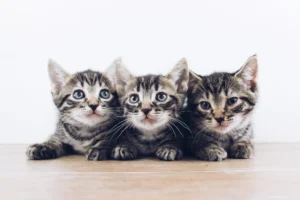Cats and humans age at different rates, but have you ever wondered why that is the case? In this blog post, we will explore the reasons behind why cat and human years differ.
The Science Behind Aging
As much as we may wish it were different, cats and humans don’t age at the same speed. But why is that? Well, let’s dive into the fascinating world of biology to understand this discrepancy.
When it comes to aging, it all boils down to telomeres. These little caps at the end of our DNA strands play a significant role in the aging process. Cats and humans have different telomere lengths, with cats having longer telomeres compared to humans. This difference means that cats age at a slower rate than humans.
So, the next time your feline friend seems to be defying the laws of aging, you can thank their longer telomeres for that!
Comparing Life Stages
Have you ever wondered why your cat seems to mature faster than you do? It all comes down to the developmental milestones unique to each species. Let’s take a closer look at how cats and humans progress through life.
While humans go through various life stages such as baby, toddler, child, adolescent, and so on, cats have a more streamlined development process. Kittens mature quickly in their first year, reaching all the major milestones in a short amount of time. This rapid development contributes to the perception that cats age faster than humans.
So, the next time you compare your age to your cat’s, remember that it’s all about the unique life stages each species goes through!
Environmental Factors
When it comes to understanding why cats and humans age differently, we must consider the impact of environmental factors. Cats tend to live shorter lives than humans due to a variety of factors in their environment. Indoor cats typically live longer than outdoor cats, as they are exposed to fewer risks such as accidents, diseases, and predators. Contaminants in the environment can also affect a cat’s health, leading to a shorter lifespan.
On the other hand, humans generally have a longer lifespan as they have more control over their environment. Access to clean water, proper sanitation, and healthcare significantly contribute to human longevity. While environmental factors play a role in both cat and human aging processes, the level of control over these factors greatly differs between the two species.
Health and Lifespan
Health and lifespan are crucial factors that influence the aging process of both cats and humans. Genetics play a significant role in determining lifespan, with some breeds of cats naturally living longer than others. Similarly, humans inherit genes that can affect their longevity, with factors such as family history playing a key role.
Diet is another essential factor impacting the lifespan of both cats and humans. A balanced diet rich in nutrients can help both species live longer and healthier lives. Regular exercise is also essential for maintaining overall health and preserving youthfulness.
Furthermore, healthcare plays a vital role in extending lifespan. Regular veterinary check-ups for cats and medical screenings for humans can detect and address health issues early on, leading to a longer and healthier life. Vaccinations and preventative care also contribute to maintaining good health throughout the lifespan.
Key Insights:
- Spaying and neutering: Sterilizing cats can increase their lifespan and prevent certain health issues.
- Quality of life: Providing a stimulating environment for cats and maintaining a healthy lifestyle for humans can contribute to a longer lifespan.
Remember, understanding the impact of environmental factors, genetics, diet, and healthcare is essential in comprehending why cats and humans age at different rates. By prioritizing health and making conscious choices, both species can lead longer, healthier lives.
Age-Related Behaviors
Cats and humans age differently, which can be seen in their behaviors as they grow older. While humans may experience a gradual decline in physical abilities and increased health concerns as they age, cats tend to mask signs of illness or discomfort until they become more severe. This can make it challenging for cat owners to notice age-related changes in their feline companions compared to humans.
Cats may exhibit behavioral changes such as increased vocalization, decreased grooming habits, or changes in appetite as they age. On the other hand, humans may display behaviors like forgetfulness, slower movement, or decreased energy levels. Understanding these differences in age-related behaviors can help pet owners provide better care for their aging cats and loved ones.
Interesting Facts About Cat and Human Aging
Did you know that one year in a cat’s life is roughly equivalent to five to seven years in a human’s life? This is due to differences in how cats and humans age at a cellular level. While humans typically live much longer than cats, the aging process occurs at a faster rate in felines, making their lifespan shorter but more intense in terms of biological changes.
Another interesting fact is that cats are considered seniors around the age of seven, while humans are not classified as seniors until they reach age 65 or older. This highlights the vast discrepancy in aging timelines between cats and humans, emphasizing the importance of understanding age-related differences in caring for our furry companions and aging loved ones.
Fun Facts about Cat and Human Aging:
- Cats can sleep up to 16 hours a day, which is double the amount of sleep humans need on average.
- A cat’s whiskers not only help with navigation but also act as an indicator of their mood and surroundings.
- Human brains tend to shrink with age, but cats’ brains remain about the same size throughout their lives, contributing to their sharp cognitive abilities.
By exploring these unique facts about cat and human aging, we can gain a deeper appreciation for the distinct ways in which our furry friends and ourselves experience the passage of time and the aging process.
Tips for Aging Gracefully
As we age, it’s essential to take care of our bodies and minds to ensure a happy and healthy life. The same goes for our feline friends! To promote healthy aging in both cats and humans, it’s crucial to prioritize regular exercise. Whether it’s a brisk walk around the neighborhood or some playtime with toys, staying active can help maintain muscle mass and overall well-being.
Another key tip is to focus on a balanced diet. For cats, providing high-quality, age-appropriate food is crucial for their health. Similarly, humans should aim for a diverse diet rich in fruits, vegetables, lean proteins, and whole grains to fuel their bodies with essential nutrients.
Regular visits to the vet or doctor are also essential for monitoring any potential health issues that may arise with age. By staying proactive and addressing any concerns early on, both cats and humans can enjoy a higher quality of life as they age.
And don’t forget the importance of mental stimulation! Engage your cat with interactive toys and puzzles to keep their minds sharp, while humans can benefit from hobbies, social activities, and continued learning to maintain cognitive function.
Bonus Tip: Ensure your cat has plenty of access to clean water throughout the day to help prevent dehydration, especially as they age.
The Human-Animal Bond
The special bond between cats and humans is a unique and precious relationship that brings joy and companionship to both parties. As cats age, this bond can deepen even further, as they rely on their human companions for comfort and care.
Aging can impact the human-animal bond in various ways. For cats, they may become more affectionate and seek comfort from their owners as they age. Providing a warm and loving environment can help strengthen this bond and ensure your cat feels secure and loved in their later years.
On the human side, caring for an aging cat can be incredibly rewarding, fostering a sense of empathy, compassion, and responsibility. This bond can provide emotional support, companionship, and a sense of purpose as both human and feline grow older together.
By nurturing the human-animal bond through regular grooming, playtime, and cuddles, both cats and humans can continue to enjoy a strong and loving connection well into their golden years.
Remember: The human-animal bond is a powerful force that benefits both parties, so cherish and nurture this special relationship as your cat and you age together.
Alex, a passionate animal lover, has experience in training and understanding animal behavior. As a proud pet parent to two dogs and three cats, he founded AnimalReport.net to share insights from animal experts and expand his knowledge of the animal kingdom.




